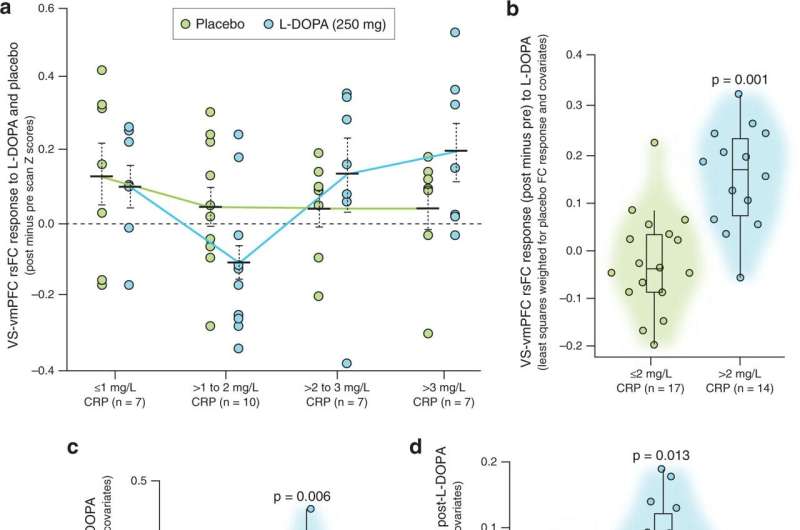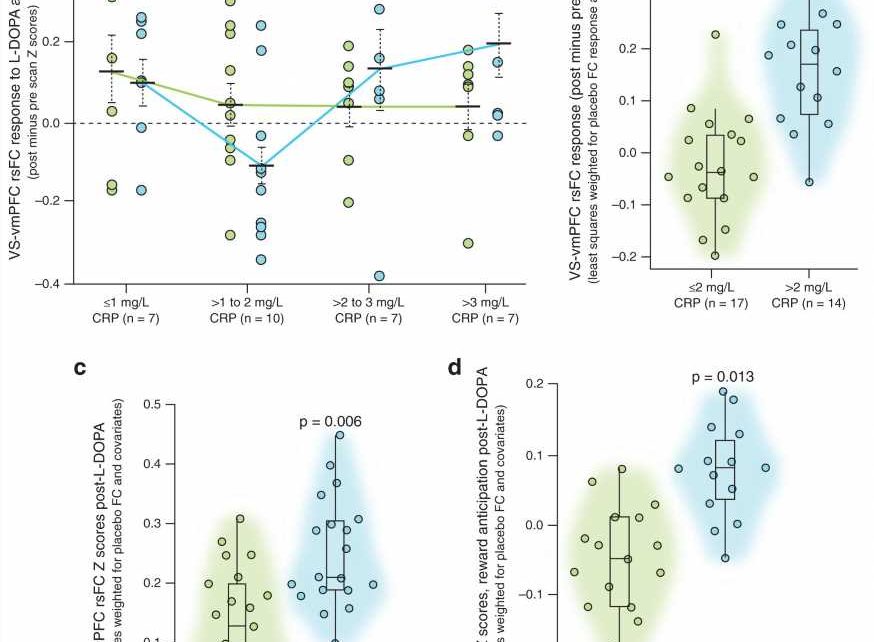
An Emory University study published in Molecular Psychiatry shows levodopa, a drug that increases dopamine in the brain, has potential to reverse the effects of inflammation on brain reward circuitry, ultimately improving symptoms of depression.
Numerous labs across the world have shown that inflammation causes reduced motivation and anhedonia, a core symptom of depression, by affecting the brain’s reward pathways.
Past research conducted by the Department of Psychiatry and Behavioral Sciences at Emory University School of Medicine has linked the effects of inflammation on the brain to decreased release of dopamine, a chemical neurotransmitter that regulates motivation and motor activity, in the ventral striatum.
In the study, researchers demonstrated that levodopa reversed the effects of inflammation on the brain’s functional connectivity in reward circuitry and anhedonia (inability to feel pleasure) in depressed individuals with higher C-reactive protein (CRP), a blood biomarker produced and released by the liver in response to inflammation.
Levels of inflammation can be easily measured by simple blood tests, like CRP, readily available in clinics and hospitals throughout the U.S.
The study included 40 depressed patients with a range of CRP levels from high to low who underwent functional brain scans on two visits after receiving in random order either placebo or levodopa, a drug often prescribed for disorders like Parkinson’s disease.
Levodopa improved functional connectivity in a classic ventral striatum to ventromedial prefrontal cortex reward circuit but only in patients with higher levels of CRP. This improvement in reward circuitry in depressed individuals with higher CRP also correlated with reduced symptoms of anhedonia after levodopa.
“This research demonstrates the translational potential for use of inflammation-related deficits in functional connectivity and could have important implications for the future investigations of precision therapies for psychiatric patients with high inflammation,” says principal investigator and senior author Jennifer C. Felger, Ph.D., associate professor of psychiatry and behavioral sciences, Emory School of Medicine.
Felger says the study findings are critical for two reasons. First, they suggest depressed patients with high inflammation may specifically respond to drugs that increase dopamine.
Second, Felger says these findings also provide additional evidence that functional connectivity in reward circuitry may serve as a reliable brain biomarker for the effects of inflammation on the brain.
“Moreover, as the effect of levodopa was specific to depressed patients with higher inflammation, this functional connectivity may be used to assess the responsiveness of the brain to novel treatments that might be targeted to this subtype of depressed patients in future studies and clinical trials,” says Felger.
More information:
Mandakh Bekhbat et al, Functional connectivity in reward circuitry and symptoms of anhedonia as therapeutic targets in depression with high inflammation: evidence from a dopamine challenge study, Molecular Psychiatry (2022). DOI: 10.1038/s41380-022-01715-3
Journal information:
Molecular Psychiatry
Source: Read Full Article



